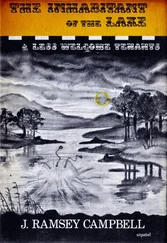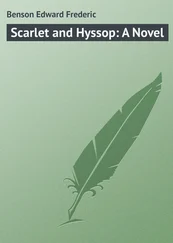Miss Coles was strolling along in the attire to which Tilling generally had got accustomed, but Miss Mapp never. She had an old wide-awake hat jammed down on her head, a tall collar and stock, a large loose coat, knickerbockers and grey stockings. In her mouth was a cigarette, in her hand she swung the orthodox wicker basket. She had certainly been to the other fishmonger's at the end of the High Street, for a lobster, revived perhaps after a sojourn on the ice, by this warm sun, which the butterflies and the swallows had been rejoicing in, was climbing with claws and waving legs over the edge of it.
Irene removed her cigarette from her mouth and did something in the gutter which is usually associated with the floor of third-class smoking carriages. Then her handsome, boyish face, more boyish because her hair was closely clipped, broke into a broad grin.
"Hello, Mapp!" she said. "Been giving the tradesmen what for on Tuesday morning?"
Miss Mapp found it extremely difficult to bear this obviously insolent form of address without a spasm of rage. Irene called her Mapp because she chose to, and Mapp (more bitterness) felt it wiser not to provoke Coles. She had a dreadful, humorous tongue, an indecent disregard of public or private opinion, and her gift of mimicry was as appalling as her opinion about the Germans. Sometimes Miss Mapp alluded to her as "quaint Irene", but that was as far as she got in the way of reprisals.
"Oh, you sweet thing!" she said. "Treasure!"
Irene, in some ghastly way, seemed to take note of this. Why men like Captain Puffin and Major Flint found Irene "fetching" and "killing" was more than Miss Mapp could understand, or wanted to understand.
Quaint Irene looked down at her basket. "Why, there's my lunch going over the top like those beastly British Tommies," she said. "Get back, love."
Miss Mapp could not quite determine whether "love" was a sarcastic echo of "Treasure." It seemed probable.
"Oh, what a dear little lobster," she said. "Look at his sweet claws."
"I shall do more than look at them soon," said Irene, poking it into her basket again. "Come and have tiffin, quai-hai, I've got to look after myself today."
"What has happened to your devoted Lucy?" asked Miss Mapp. Irene lived in a very queer way with one gigantic maid, who, but for her sex, might have been in the Guards.
"Ill. I suspect scarlet-fever," said Irene. "Very infectious, isn't it? I was up nursing her all last night."
Miss Mapp recoiled. She did not share Major Flint's robust views about microbes.
"But I hope, dear, you've thoroughly disinfected —"
"Oh, yes. Soap and water," said Irene. "By the way, are you Poppiting this afternoon?"
"If I can squeeze it in," said Miss Mapp.
"We'll meet again, then. Oh —"
"Au reservoir," said Miss Mapp instantly.
"No; not that silly old chestnut!" said Irene. "I wasn't going to say that. I was only going to say: 'Oh, do come to tiffin.' You and me and the lobster. Then you and me. But it's a bore about Lucy. I was painting her. Fine figure, gorgeous legs. You wouldn't like to sit for me till she's well again?"
Miss Mapp gave a little squeal and bolted into her dressmaker's. She always felt battered after a conversation with Irene, and needed kingfisher blue to restore her.
Table of Contents
There is not in all England a town so blatantly picturesque as Tilling, nor one, for the lover of level marsh land, of tall reedy dykes, of enormous sunsets and rims of blue sea on the horizon, with so fortunate an environment. The hill on which it is built rises steeply from the level land, and, crowned by the great grave church so conveniently close to Miss Mapp's residence, positively consists of quaint corners, rough-cast and timber cottages, and mellow Georgian fronts. Corners and quaintnesses, gems, glimpses and bits are an obsession to the artist, and in consequence, during the summer months, not only did the majority of its inhabitants turn out into the cobbled ways with sketching-blocks, canvases and paintboxes, but every morning brought into the town charabancs from neighbouring places loaded with passengers, many of whom joined the artistic residents, and you would have thought (until an inspection of their productions convinced you of the contrary) that some tremendous outburst of Art was rivalling the Italian Renaissance. For those who were capable of tackling straight lines and the intricacies of perspective, there were the steep cobbled streets of charming and irregular architecture, while for those who rightly felt themselves colourists rather than architectural draughtsmen, there was the view from the top of the hill over the marshes. There, but for one straight line to mark the horizon (and that could easily be misty) there were no petty conventionalities in the way of perspective, and the eager practitioner could almost instantly plunge into vivid greens and celestial blues, or, at sunset, into pinks and chromes and rose-madder.
Tourists who had no pictorial gifts would pick their way among the sketchers, and search the shops for cracked china and bits of brass. Few if any of them left without purchasing one of the famous Tilling money-boxes, made in the shape of a pottery pig, who bore on his back that remarkable legend of his authenticity which ran:
I won't be druv,
Though I am willing.
Good-morning, my love,
Said the Pig of Tilling.
Miss Mapp had a long shelf full of these in every colour to adorn her dining-room. The one which completed her collection, of a pleasant magenta colour, had only just been acquired. She called them "My sweet rainbow of piggies," and often when she came down to breakfast, especially if Withers was in the room, she said: "Good-morning, quaint little piggies." When Withers had left the room she counted them.
The corner where the street took a turn towards the church, just below the window of her garden-room, was easily the most popular stance for sketchers. You were bewildered and bowled over by "bits". For the most accomplished of all there was that rarely attempted feat, the view of the steep downward street, which, in spite of all the efforts of the artist, insisted, in the sketch, on going up hill instead. Then, next in difficulty, was the street after it had turned, running by the gardener's cottage up to the churchyard and the church. This, in spite of its difficulty, was a very favourite subject, for it included, on the right of the street, just beyond Miss Mapp's garden wall, the famous crooked chimney, which was continually copied from every point of view. The expert artist would draw it rather more crooked than it really was, in order that there might be no question that he had not drawn it crooked by accident. This sketch was usually negotiated from the three steps in front of Miss Mapp's front door. Opposite the church-and-chimney-artists would sit others, drawing the front door itself (difficult), and moistening their pencils at their cherry lips, while a little farther down the street was another battalion hard at work at the gabled front of the garden-room and its picturesque bow. It was a favourite occupation of Miss Mapp's, when there was a decent gathering of artists outside, to pull a table right into the window of the garden-room, in full view of them, and, quite unconscious of their presence, to arrange flowers there with a smiling and pensive countenance. She had other little playful public pastimes: she would get her kitten from the house, and induce it to sit on the table while she diverted it with the tassel of the blind, and she would kiss it on its sweet little sooty head, or she would write letters in the window, or play Patience there, and then suddenly become aware that there was no end of ladies and gentlemen looking at her. Sometimes she would come out of the house, if the steps were very full, with her own sketching paraphernalia in her hands and say, ever so coyly: "May I scriggle through?" or ask the squatters on her own steps if they could find a little corner for her. That was so interesting for them: they would remember afterwards that just while they were engaged on their sketches, the lady of that beautiful house at the corner, who had been playing with her kitten in the window, came out to sketch too. She addressed gracious and yet humble remarks to them: "I see you are painting my sweet little home. May I look? Oh, what a lovely little sketch!" Once, on a never-to-be-forgotten day, she observed one of them take a camera from his pocket and rapidly focus her as she stood on the top step. She turned full-faced and smiling to the camera just in time to catch the click of the shutter, but then it was too late to hide her face, and perhaps the picture might appear in the Graphic or the Sketch, or among the posturing nymphs of a neighbouring watering-place . . .
Читать дальше












